Tag
#git
A high court in London says the WikiLeaks founder won’t be extradited “immediately” and the US must provide more “assurances” about any extradition.
### Impact A number of Nautobot URL endpoints were found to be improperly accessible to unauthenticated (anonymous) users, including the following: - `/api/graphql/` (1) - `/api/users/users/session/` (Nautobot 2.x only; the only information exposed to an anonymous user is which authentication backend classes are enabled on this Nautobot instance) - `/dcim/racks/<uuid:pk>/dynamic-groups/` (1) - `/dcim/devices/<uuid:pk>/dynamic-groups/` (1) - `/extras/job-results/<uuid:pk>/log-table/` - `/extras/secrets/provider/<str:provider_slug>/form/` (the only information exposed to an anonymous user is the fact that a secrets provider with the given slug (e.g. `environment-variable` or `text-file`) is supported by this Nautobot instance) - `/ipam/prefixes/<uuid:pk>/dynamic-groups/` (1) - `/ipam/ip-addresses/<uuid:pk>/dynamic-groups/` (1) - `/virtualization/clusters/<uuid:pk>/dynamic-groups/` (1) - `/virtualization/virtual-machines/<uuid:pk>/dynamic-groups/` (1) (1) These endpoints will not discl...
Vans warns its customers about phishing and other fraud attacks in the aftermath of a ransomware attack in December
### Summary The `email` field in phpMyFAQ's user control panel page is vulnerable to stored XSS attacks due to the inadequacy of PHP's `FILTER_VALIDATE_EMAIL` function, which only validates the email format, not its content. This vulnerability enables an attacker to execute arbitrary client-side JavaScript within the context of another user's phpMyFAQ session. ### Details Despite using PHP's `FILTER_VALIDATE_EMAIL` function, the email field does not adequately validate the content of the email address. This means that malicious input, such as JavaScript code, can be accepted and stored in the database without being detected. When the stored data is retrieved and displayed on web pages, it is not properly sanitized to remove or neutralize any potentially harmful content, such as JavaScript code which leads to Stored XSS. ### PoC 1. Login as any user, go to the user control panel, change email to any valid email and intercept the request. 2. Modify the request’s email parameter to t...
### Summary The category image upload function in phpmyfaq is vulnerable to manipulation of the `Content-type` and `lang` parameters, allowing attackers to upload malicious files with a .php extension, potentially leading to remote code execution (RCE) on the system. ### Details In the file upload function of the category image, the `Content-type` can be manipulated to return an empty string for the extension and the `lang` parameter can be set to `.php.` to allow an attacker to save a file as `.PHP`. This allows the uploading of web shells which could lead to RCE on phpmyfaq. ### PoC 1. Generate a fake .GIF file that contains a php command using the tool `gifsicle` a. Cmd: `gifsicle < test1.gif --comment "<?php system('whoami'); ?>" > output.php.gif`  b. The contents of the file should look like this: %3c%2fscript%3e` 2. Browse to the particular news page and the XSS should pop up. 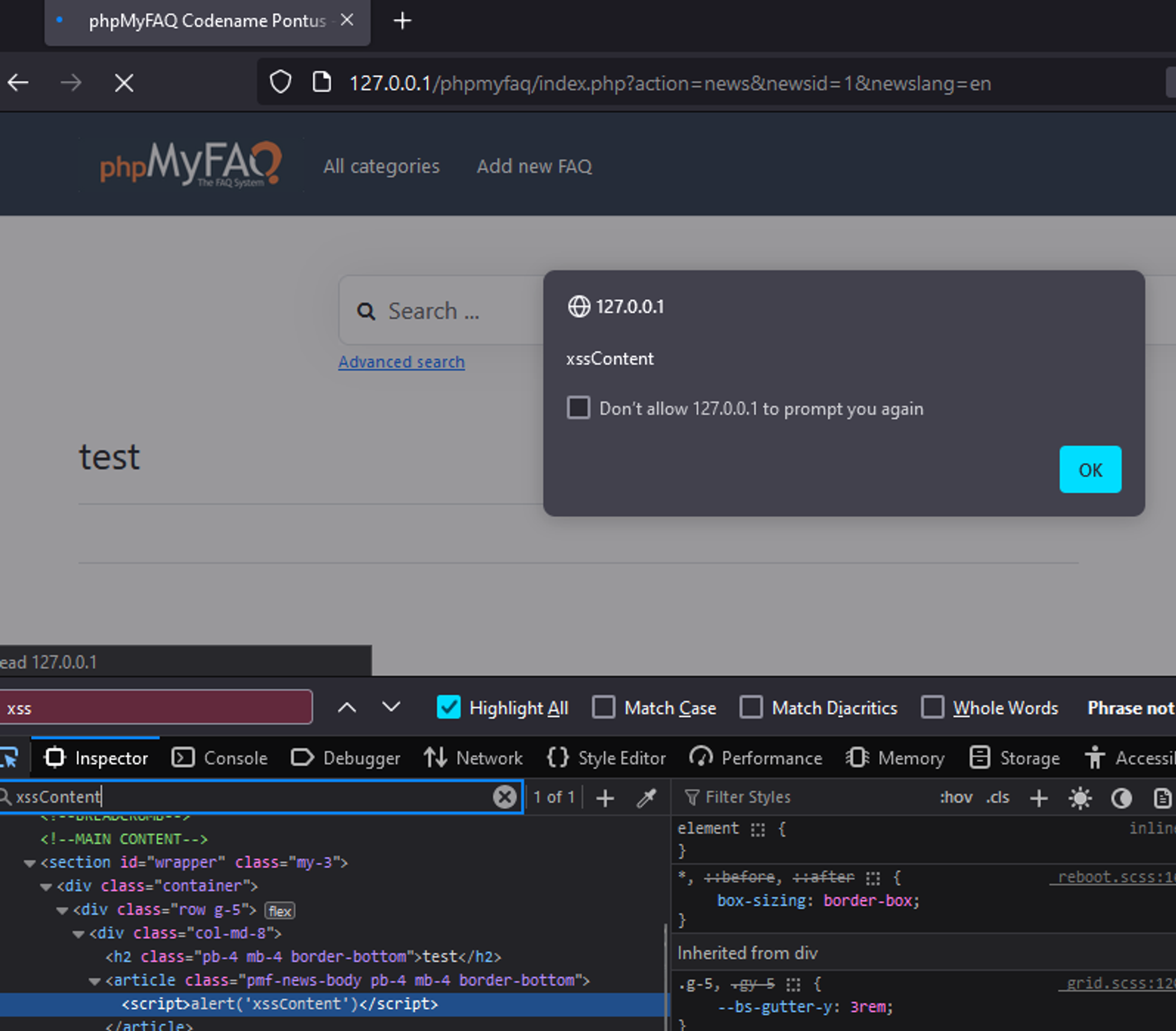 ### Impact This allows an attacker to execute arbitrary client side JavaScript within the context of another user's phpMyFAQ session
### Summary A SQL injection vulnerability has been discovered in the `insertentry` & `saveentry` when modifying records due to improper escaping of the email address. This allows any authenticated user with the rights to add/edit FAQ news to exploit this vulnerability to exfiltrate data, take over accounts and in some cases, even achieve RCE. ### PoC 1 - SQL Injection at insertentry: 1. Browse to “/admin/?action=editentry”, edit record and save. Intercept the POST request to "/admin/?action=insertentry" and modify the email and notes parameters in the body to the payloads below: a. `email=test'/*@email.com` b. `notes=*/,1,1,1,1,null,1);select+pg_sleep(5)--` 2. Send the request and notice the `pg_sleep(5)` command is executed with a time delay of 5 seconds in the response. This verifies that the SQL injection vulnerability exists. 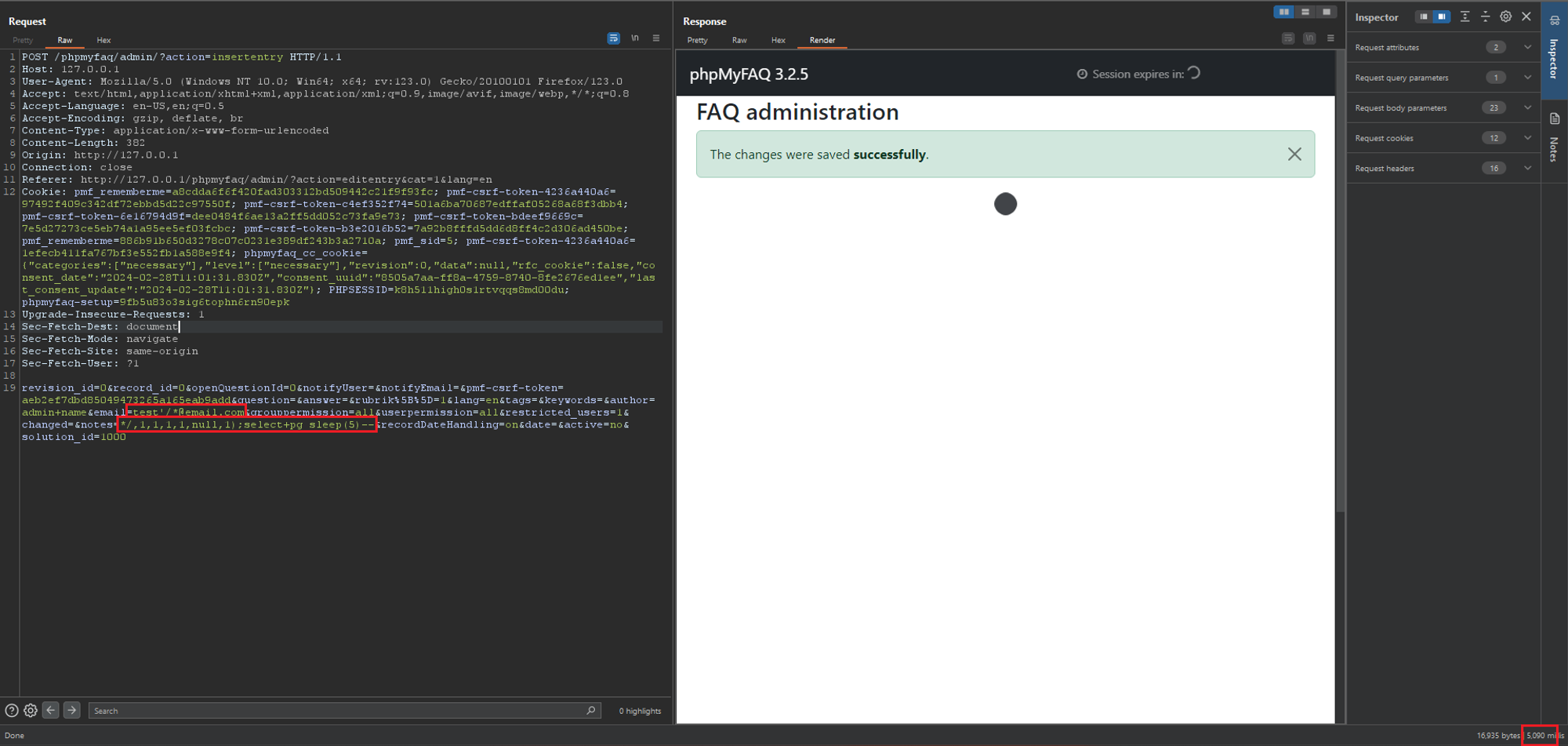 ### PoC 2 - SQL Injection at saveentry 1....
### Summary Due to insufficient validation on the `contentLink` parameter, it is possible for unauthenticated users to inject HTML code to the page which might affect other users. _Also, requires that adding new FAQs is allowed for guests and that the admin doesn't check the content of a newly added FAQ._ ### PoC 1. Browse to ../phpmyfaq/index.php?action=add&cat=0 , enter `https://test.com?p=<h1>HTML_INJECTION</h1>` for the contentLink parameter. 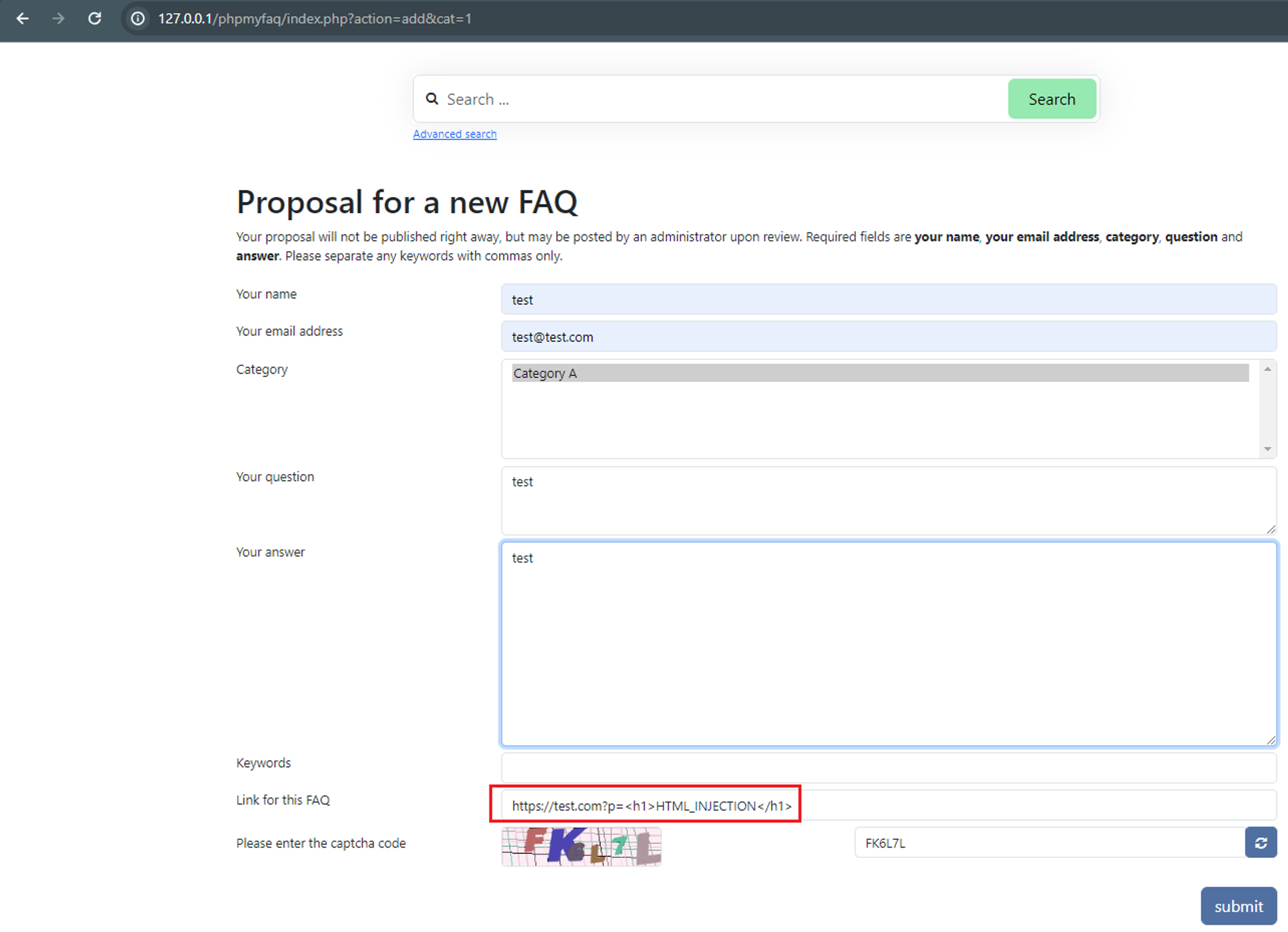 2. Verify the HTML injection by viewing the FAQ itself, “All categories” → “CategoryName” → ”QuestionName”. 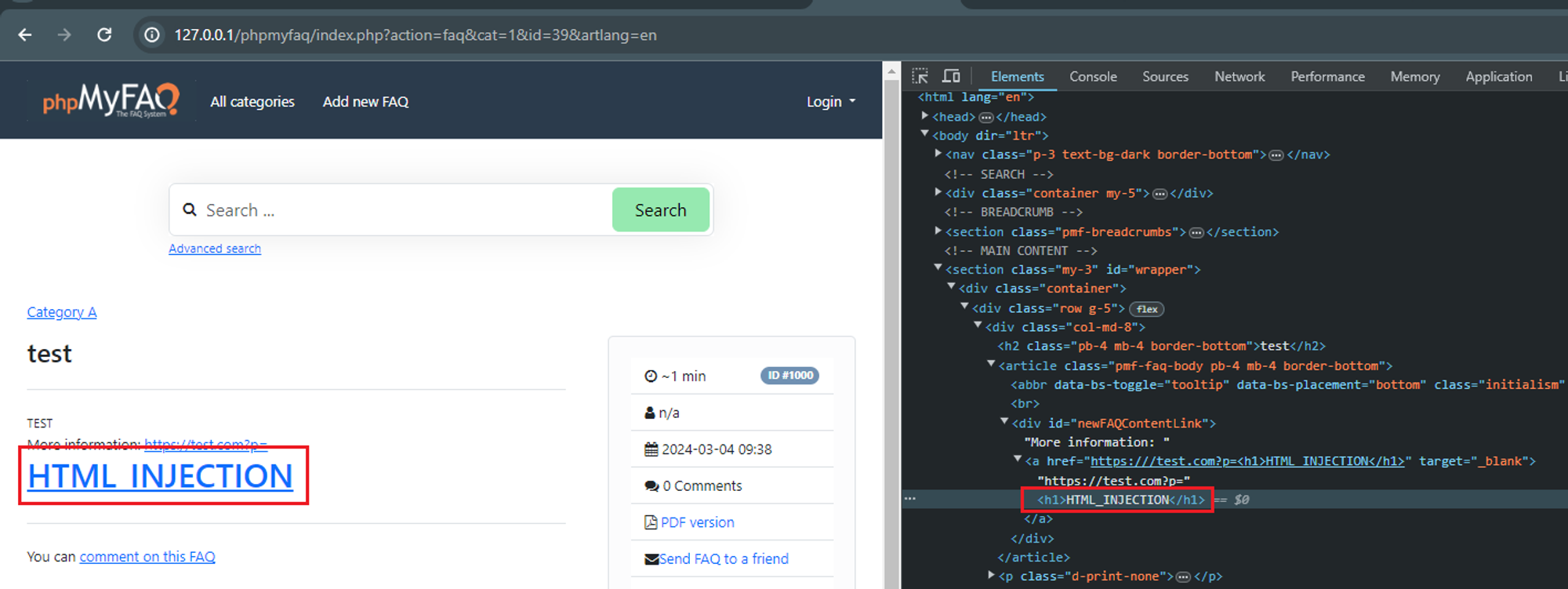 ### Impact Attackers can manipulate the appearance and functionality of web pages by injecting malicious HTML code. This can lead to various undesirable outcomes, such as defacing the website, redirecting users to malicious sites, or alte...
### Summary An attacker with admin privileges can upload an attachment containing JS code without extension and the application will render it as HTML which allows for XSS attacks. ### Details When attachments are uploaded without an extension, the application renders it as HTML by default. Therefore allowing attackers to upload .html files containing javascript code to perform XSS attacks. The direct file path to the uploaded attachment is also easily obtainable as it is made up of substrings of the file's MD5 hashes. ### PoC 1. Admin users can upload attachments containing XSS payloads in files without extensions to bypass the .html extension check. 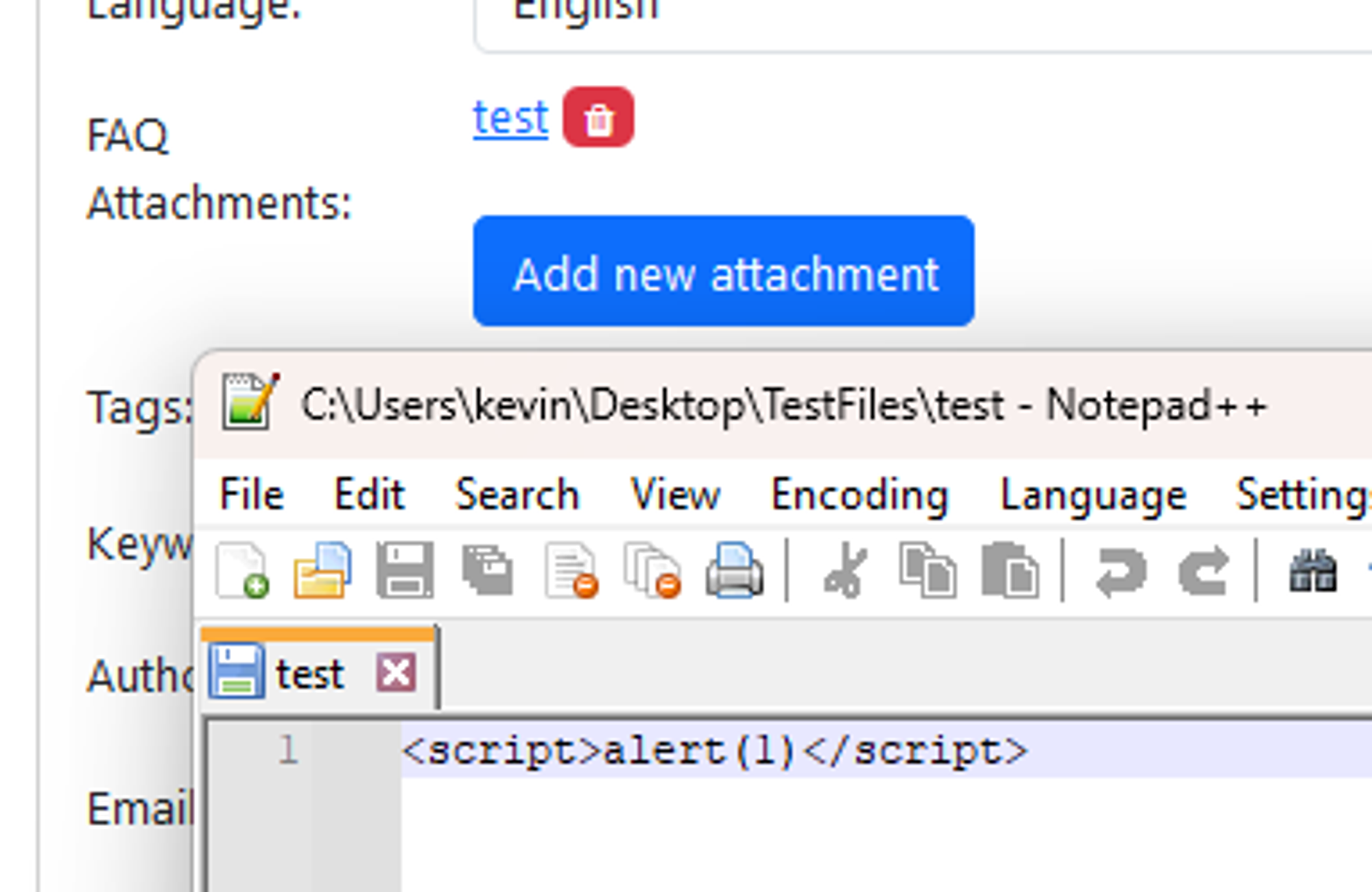 2. Since the path of the uploaded file is built entirely on the file’s MD5 hash and the attachment directory, it is possible for an attacker to know the direct path of the uploaded file. E.g file MD5 hash: 38fff51cb7248a06d6142c6bdf84...
### Summary A SQL injection vulnerability has been discovered in the the "Add News" functionality due to improper escaping of the email address. This allows any authenticated user with the rights to add/edit FAQ news to exploit this vulnerability to exfiltrate data, take over accounts and in some cases, even achieve RCE. ### Details The vulnerable field lies in the `authorEmail` field which uses PHP's `FILTER_VALIDATE_EMAIL` filter. This filter is insufficient in protecting against SQL injection attacks and should still be properly escaped. However, in this version of phpMyFAQ (3.2.5), this field is not escaped properly can be used together with other fields to fully exploit the SQL injection vulnerability. ### PoCs 4 PoCs are demonstrated here to illustrate the potential impacts. #### PoC 1 - Postgres Time Based SQLi 1. Login as admin or any user with the rights to view and save news. 2. Navigate to "../phpmyfaq/admin/?action=news", click on "Add news", fill in some data, send and...